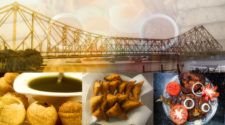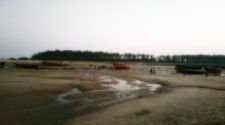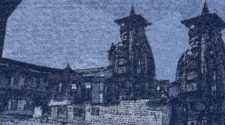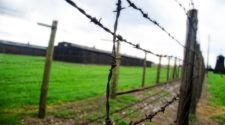“Guns had been fired, lives had been lost and the widows had to pay the cost of a battle.”
Full scale war wasn’t a certainty yet at that point of time. The British had set up a blockade and Chinese were offering to let British captains dock so long as they signed a bond, barring them from doing trade on drugs. A violation was supposed to be subjected to Chinese law. But the British had their law in its place- ‘No British ship was to trade with the Chinese’. Tensions were at the topmost altitude.
On the 3rd November 1839, a British ship by the name of ‘Royal Saxon’ approached Canton. The ship was signaled by the British soldiers to stop and turn back, but they had to make a run for it. One of the volage under ‘Captain Henry Smith’ fired a warning shot; it skipped past their bow but the shot was heard from the shore. The Chinese admiral stationed at Canton made his decision. He would send out his fleet to protect the ‘Royal Saxon’. In response a small host of junks and fire ships under Admiral Kuan Tien-pei began to pour out of Canton harbour. The situation seemed confusing because the Chinese were defending a British ship standing against the British soldiers. The commander of the ship that had originally fired the shot, requested for permission to engage.
‘Captain Elliot’, the superintendent of British trade and the man who had convinced the British merchants to hand over their opium in the first place, initially wavered, but the Chinese ships were acting on his nerves. Another ‘Request to Engage’ was made. By now the Chinese ships were festooned with red flags, the colour of war. The honour of his nation and his flag would not allow Elliot to back down before such intimidation. The order was given and the men were engaged. The first broadside roared over the water. British shells shredded one of the fire rafts, converting into gout of flame mirrored by the sea. One of the war junk’s magazines had been hit, and it was a cataclysmic explosion. All that was left of the ship were burning planks carried by the waves. The ships turned to give another broadside but the outmatched Chinese junks began to retreat. Only the proud admiral’s flagship was left standing defiantly, returning shot after shot. But it was hopelessly outclassed and damaged. Seeing the admiral standing alone, Elliot ordered his captains to ceasefire. The point had been made by him. There was no need for any sort of meaningless slaughter. As a result of the ceasefire, the flagship turned and limped back to port. The first ‘Opium-Battle’ had ended, with the British bombarding the Chinese forces for defending a British ship which they themselves had originally fired on.
For a period of time that followed, there was sort of a lull. Some in China opined that the British had gone too far away so as to seriously pursue a war. But the truth was that the British were simply mustering their forces. Simultaneously at that very moment, men from India were being redeployed and transported to China, so the best ships had to be dispatched from British naval yards to serve in the battle. Many in the ‘British Admiralty’ saw this as an excellent opportunity to field-test the iron, steam and rail ships that had just started rolling off the lines. When the forces arrived though, the British descended on the island of Chusan. The Chinese and the British officials met once at each one of their flagship. Each time, the British made their demands clear- ‘Surrender the island and no one will be harmed’. Each time the Chinese responded in baffle disbelief. The Chinese officials tried to sort of convince the British that – ‘Hey, we never meant any harm. It’s not right to punish us for the act of those in Canton!’ They implored the British to turn back, but the British had to pursue their duty, and as the Chinese officials made clear on their way out, so did they.
The next morning after the final meeting, the bombardment began early. Soon the Chinese forces began to retreat behind the walls of their city and the British marines landed unopposed. They set up their guns and rested for the night. By the next day they found the city to be nearly deserted. Chusan had been captured with very little loss of life and should they decide to threaten Shanghai, the British had gained a jump off point to start their operations. By this point, the emperor had dismissed ‘Lin Zexu’, the righteous minister who he had so celebrated for a short while before, and replaced him with an official called ‘Qishan’, who was empowered to treat the British accordingly.
Qishan and Elliot began to discuss a settlement. They haggled over reparations for the destroyed ‘Opium’, and eventually came up with a seven figure amount – Seven million pounds. But Elliot was still supposed to get the territory for the ‘British Empire’ that they could use for a port. He offered to return Chusan in exchange for some other island, but Qishan was not supposed to give away any portion of ‘Sovereign China’. And so, the talks broke down. Then, as the ‘New Year’ passed, at least for the English, an ‘Opium Run’ which had snuck its way into Canton, came back with the rumour that the emperor intend to resume the attack.
Elliot decided that to pre-empt such an assault, through the wisdom of trusting these unsubstantiated rumours coming from ‘Opium Runners’, is a bit questionable. Really, it was unlikely for such an attack to happen the way they were feared. However, on the morning of January 7th 1841, working with the information they had, Elliot commanded the British forces to open-fire on the fortifications of Chuenpee near Canton. The battle lasted merely for hours. The British guns ripped through the fortifications and silenced any counter batteries with haste. Then the British and Indian marines landed and swiftly pushed the Chinese ‘Ground Forces’ to retreat. Tragically, a rumour had been circulating among the Chinese that the British had executed every prisoner they could capture. The reason why many hopelessly fought on to the death until their battalions were tattered and their dead outnumbered their living. By 11:00 in the morning, the British flag flew over the Chinese battlements. 6oo Chinese dead; a meagre 100 were captured. Among the British, only 30 were wounded and those were not even from an enemy fire, but because their pieces of ammunition overheated and exploded. The nemesis, the iron steam behemoth had demonstrated the power of its guns and rockets, dispatching junks and chasing the Chinese fleet away.
Three further forts stood to be captured, but the very next morning, a Chinese physician came under flag of truce to ask on behalf of Qishan. Horrified by the slaughter he had just witnessed, he wrote to one of the British traders who were pushing for the war that he had hoped to resolve it without further bloodshed and that, if further conflict was necessary, it was clear that they could take what they wanted. Despite the overwhelming desire of the troops to cut their way to Canton, Elliot acquiesced and agreed to meet. Soon, terms were chiselled out. The Chinese would pay six million in reparations. The British would pay six million to buy the island of Hong Kong. Ambassadors would be exchanged. The Chinese agreed not to call the British – ‘The tribute bearing barbarians’ anymore. British would return all the forts and the territory that they had taken during the war, and most importantly, trade would resume in a much freer and open manner. So, the problem seemed to be solved because the Chinese got just about the best terms they could conceivably hope for, under the circumstances, and the British got to fulfill their mission and open up a whole new empire for trade!
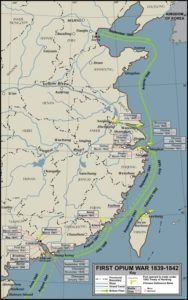
There had been some bloodshed, but in the end everybody was happy, am I correct? Well, not exactly! Elliot’s superior back in England, a fellow named Lord Palmerston, who will undoubtedly crop-up in this story down the lines, wasn’t happy. They didn’t get the reparations for the destroyed opium and didn’t get to keep the territory- Chusan and Chuenpee they had just won. They didn’t get as many open ports as he would like and perhaps most of all, he was livid that Elliot, who had never really been comfortable with the drug trade in the first place, didn’t even ask that the ‘Opium’ be legalized in China. So, Elliot, for his swift and nearly bloodless execution of the war was dismissed and sent packing to return home. As for Qishan, the emperor had to be ecstatic about these terms; shouldn’t I be once again considered to be correct? I mean, the Chinese were clearly outmatched, and at the end of the day, all they had to cede was a barren rock in the middle of the ocean. Seems like a pretty good deal to me. Well, the emperor was not so happy. In fact he immediately recalled Qishan and ordered that he be executed for treason. Apparently he thought that they could have gotten a better deal. However somehow he managed to live, needless to say that neither party ever signed this treaty. The incident that followed after was a full scale war where all the voices of reason had been removed from a situation that was going out of hands, for both the parties.
Interactive MapMap image attribution: Wikipedia (Wikimedia – Creative Commons)
Philg88 [CC BY 4.0 (https://creativecommons.org/licenses/by/4.0)]
Featured image courtesy: pxhere.com
Upcoming: Final Part of the Series




